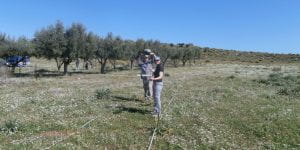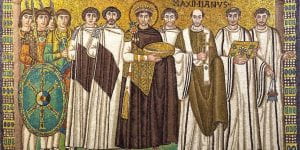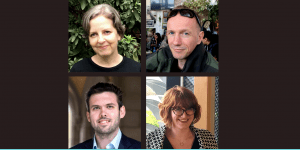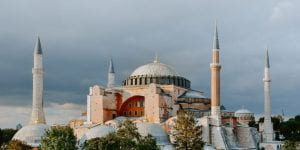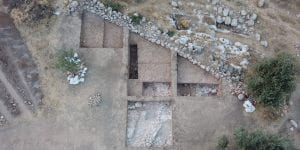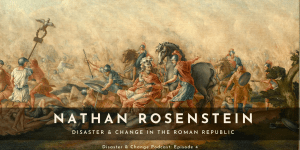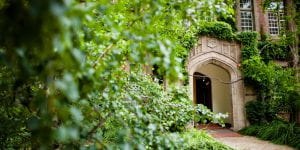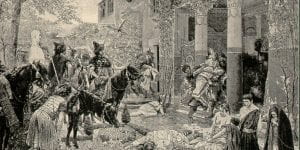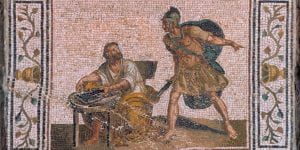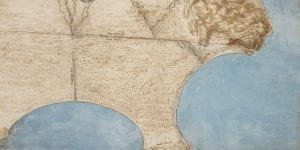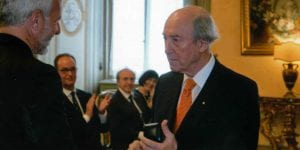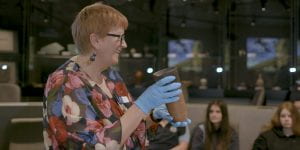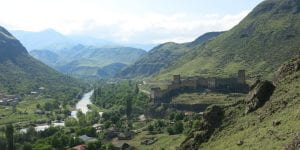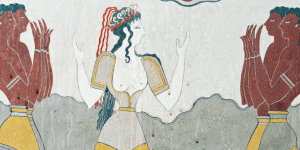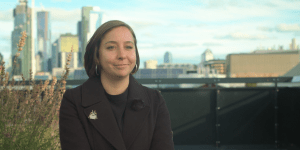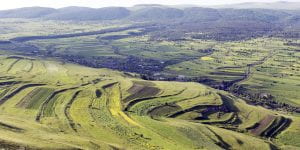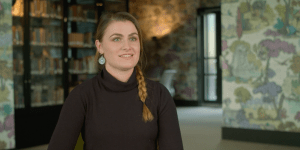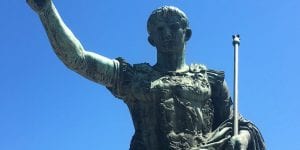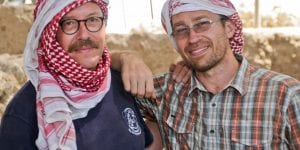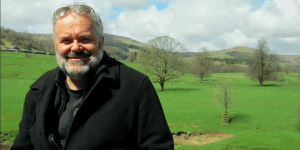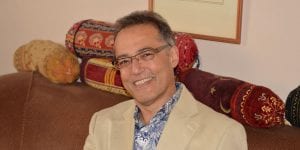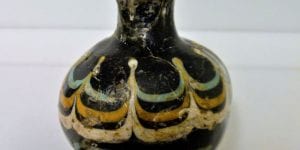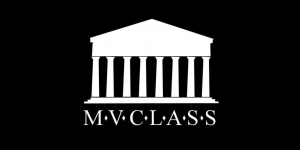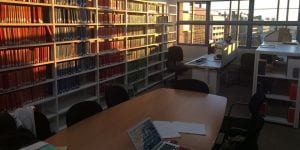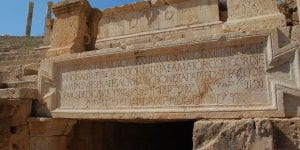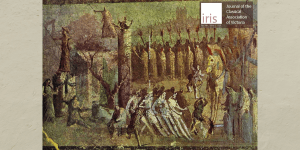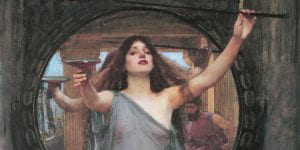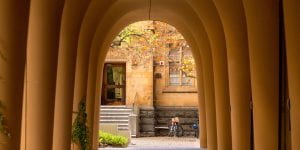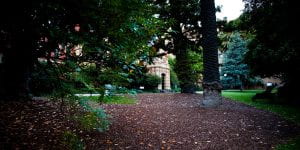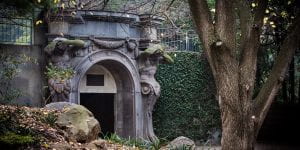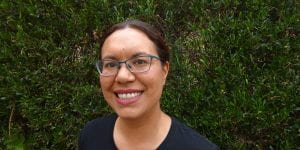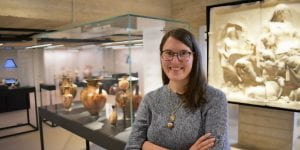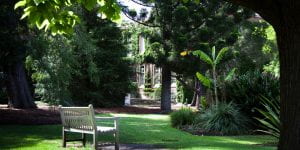Category: Classics & Archaeology
-
Welcome Dr Lieve Donnellan!
This semester we welcome Dr Lieve Donnellan, incoming Lecturer in Classical Archaeology. Lieve comes to the university from her previous role as Assistant Professor of Classical Archaeology at the University of Aarhus in Denmark. After graduating in archaeology from Ghent University in 2012, Lieve held various fellowships and positions at the Universities of Chicago, Göttingen […]blogs.unimelb.edu.au/shaps-research/2020/09/08/welcome-dr-lieve-donnellan
-
Volcanic Winter and Pandemic Pandemonium
A terrible onslaught of bubonic plague in the sixth century abruptly ended Emperor Justinian’s dream of reunifying the Roman empire and caused massive geopolitical upheaval. Associate Professor Frederik Vervaet from Classics & Archaeology tells us more about this ancient pandemic and its consequences in this article republished from Pursuit. In 527 CE, when Emperor Justinian […]blogs.unimelb.edu.au/shaps-research/2020/08/16/volcanic-winter-and-pandemic-pandemonium
-
Chris Bendle
Chris Bendle, ‘The Office of Magister Militum in the 4th Century CE: A Study into the Political and Military History of the Later Roman Empire’ (MA in Classics & Archaeology, 2020) The magistri militum were the highest-ranking generals of the late Roman imperial army. Emperor Constantine I created this office in the early part of […] -
The Inaugural SHAPS Optimus Awards
In 2019 SHAPS Head of School Professor Margaret Cameron launched a new set of annual awards. Through the Optimus Awards, SHAPS will recognise and celebrate members of our community who exemplify one or more of the values articulated in the Faculty of Arts Strategy Map 2019–2025. All members of the School community, including undergraduate and […]blogs.unimelb.edu.au/shaps-research/2020/08/14/the-inaugural-shaps-optimus-awards
-
Hagia Sophia Reigns Serene
Istanbul’s 1,500 year-old Hagia Sophia has a tumultuous history and its return to being a mosque is only the latest twist for a building that has long rolled with the times. SHAPS Principal Fellow (Honorary) Associate Professor Roger Scott, gives us a snapshot of its history in this article, republished from Pursuit. If you were […]blogs.unimelb.edu.au/shaps-research/2020/07/23/hagia-sophia-reigns-serene
-
National Archaeology Week 2020 Goes Online
Each year in the third week of May, Australia celebrates National Archaeology Week. This year, our postgraduate community took a leading role in taking National Archaeology Week online, coming up with creative ways of promoting archaeology in a time of pandemic-related disruption. Larissa Tittl gives us a run-down on the week’s events and activities. National […]blogs.unimelb.edu.au/shaps-research/2020/06/29/national-archaeology-week-2020-goes-online
-
Episode 4 in the SHAPS Podcast Series: Professor Nathan Rosenstein
The catastrophic defeat Hannibal inflicted on Rome at Cannae in 216 BCE forced the Republic to drastically change how it would fight the Second Punic War. A strategy of direct military confrontation had to be abandoned in favour of a war of attrition. This strategic shift necessitated a series of additional changes in how Rome […]blogs.unimelb.edu.au/shaps-research/2020/06/15/disaster-change-4
-
Ashleigh Green
Ashleigh Green, ‘Birds in Roman Life & Myth‘ (PhD in Classics & Archaeology, 2020) In Ancient Rome, the role of birds in everyday life and myth was one of critical importance. This thesis examines birds in their assigned roles of divine messengers, heralds, hunting quarry, domestic flocks, and companion animals, focusing primarily on the transitional […]blogs.unimelb.edu.au/shaps-research/2020/06/05/ashleigh-green
-
Belle Shapardon
Belle Shapardon, ‘The Sioni Cultural Complex: Cultural Complexity and Interaction during the Transcaucasian Chalcolithic’ (PhD in Classics & Archaeology, 2020) In the past, the Chalcolithic period (c5000–3500 BCE) in the Transcaucasus represented a poorly defined ‘interlude’ between the Late Neolithic and the Early Bronze Age. An understanding of this period was hindered by a lack […]blogs.unimelb.edu.au/shaps-research/2020/06/02/belle-shapardon
-
The Greco-Roman and Chinese Ancient Worlds in Comparative Perspective
In late 2019 Associate Professor Hyun Jin Kim received the highest honour for achievement in the humanities in Australia, when he was elected Fellow of the Australian Academy of the Humanities. To mark this occasion, PhD candidate Larissa Tittl interviewed Hyun Jin about his career as a scholar of ancient Greece, Rome and China. First, […] -
How Plague Helped Make Rome a Superpower
Epidemics haunt history, but at a time of COVID-19 it pays to remember they shape history too, as happened in 212 BC at Syracuse. David Feeney, PhD Student in the Classics & Archaeology program in SHAPS, explores, this Ancient Roman plague during a time of warfare in an article republished from Pursuit. The dogs were […]blogs.unimelb.edu.au/shaps-research/2020/05/14/how-plague-helped-make-rome-a-superpower
-
Out of Ancient Marshes
Archaeology at the site of the former Pontine Marshes has uncovered a massive but forgotten feat of ancient land reclamation revealing the early determination of the Romans to bend the world to their will. Dr Gijs Tol from SHAPS and Dr Tymon de Hass from Leiden University explore the discoveries on the site of the […]blogs.unimelb.edu.au/shaps-research/2020/03/08/out-of-ancient-marshes
-
A Conversation with Professor Emeritus Ron Ridley, Recipient of the 2019 Premio Daria Borghese
It’s not often that you will hear an esteemed academic describe him or herself as the “last of the scallywags”, but this phrase trips easily off the tongue of Professor Emeritus Ronald T. Ridley. His career has been distinguished by a dazzling versatility and range, earning him a long list of accolades. But he somehow […] -
Hands-on Humanities: Bringing the Ancient World to Regional Victorian Schools
The study of classical antiquity and the ancient world more broadly has often been the exclusive domain of the privileged and leisured classes. State schools, especially rural ones, often lack the resources to provide their students with specialist instruction in these fields. Since 2016, Dr Sharyn Volk has been addressing this inequality through a project […] -
All Roads Lead to Rome: The Thérèse and Ronald Ridley Scholarship
In 2019, Thérèse and Ron Ridley established a scholarship to enable a PhD student in the Classics and Archaeology program at the University of Melbourne to travel to the British School at Rome. Larissa Tittl spoke with Ron Ridley, Professor Emeritus in the School of Historical and Philosophical Studies, about the new scholarship and the […] -
Castles, Caves and Rock Shelters
Archaeology in the rugged landscape of Georgia reveals a medieval world where caves and underground shelters provided refuge from raiders, allowing a threatened civilisation to flourish. Classics & Archaeology PhD Candidate Abby Robinson, along with Giorgi Khaburzania, Field archaeologist, National Agency for Cultural Heritage Preservation, Georgia, tells us more about the history of these ancient remains. […]blogs.unimelb.edu.au/shaps-research/2019/11/29/castles-caves-and-rock-shelters
-
How Do You Crack the Code to a Lost Ancient Script?
The decipherment of Linear B, the earliest form of Greek, was a history changing achievement, but decoding the older Linear A would open a new window on the origins of European culture. In one of our posts on Forum earlier in 2019, we interviewed SHAPS lecturer Brent Davis, who in this article reposted from University […]blogs.unimelb.edu.au/shaps-research/2019/11/07/how-do-you-crack-the-code-to-a-lost-ancient-script
-
Conservators at Work on Melbourne’s Metro Tunnel Project
Emma Hayles, one of our recent graduates, is now working as an archaeological conservator, looking after items uncovered during the Metro Tunnel Project excavations. After doing an undergraduate degree in Archaeology, Emma Hayles went on to complete a Master of Cultural Materials Conservation in 2017. Since 2018, she has been working on the Metro Tunnel […]blogs.unimelb.edu.au/shaps-research/2019/08/09/conservators-at-work
-
From the Field: SHAPS Students in the Southern Caucasus
Staff and students from Melbourne University’s archaeology fieldwork intensive subject in Georgia were pleasantly surprised when the Australian Ambassador to Turkey, Georgia and Azerbaijan, Marc Innes-Brown, and Second Secretary, Andrew Cooper, visited the site during the 2019 excavation season. The Ambassador shared his impressions of the visit with Larissa Tittl. The Ambassador was struck by […]blogs.unimelb.edu.au/shaps-research/2019/08/01/from-the-field
-
Archaeologists at Work on Melbourne’s Metro Tunnel Project
Archaeology PhD candidate Maddi Harris-Schober is one of a number of SHAPS students and alumni who have taken part in the archaeological digs in Melbourne’s CBD as part of the Metro Tunnel Project. In this interview, she talks about being an archaeologist, and about her experiences working on the state’s biggest ever public transport infrastructure […]blogs.unimelb.edu.au/shaps-research/2019/07/24/archaeologists-at-work
-
Revisiting Augustus’s Alternative Truth
In October 2018 the inimitable Associate Professor Frederik Vervaet presented a riveting public lecture entitled "'Monarch by Universal Consent’: Revisiting Augustus' Alternative Truth", as part of the 2018 Truth SHAPS Public Lecture seriesblogs.unimelb.edu.au/shaps-research/2019/05/01/revisiting-augustuss-alternative-truth
-
Unlocking Ancient Scripts: 2019 Michael Ventris Award winner, Brent Davis
SHAPS Classics & Archaeology lecturer Dr Brent Davis was recently awarded the prestigious Michael Ventris Award for Mycenaean Studies. He spoke with Nicole Davis about his research. -
A Year in Melbourne
Professor Tim Parkin’s reflections on his first year as Tatoulis Chair in Classics The reason the Greeks and Romans remain fascinating and significant to us in the modern world is because their influence is omnipresent and also because in studying them we constantly learn more about ourselves. In January 2018, Professor Tim Parkin arrived in […]blogs.unimelb.edu.au/shaps-research/2019/03/17/a-year-in-melbourne
-
Honouring the Life and Work of Tony Sagona
Free-threshing wheat, a small piece of inscribed banded agate, the myth of Jason and Medea... are all elements in the stories told by presenters at a recent Classics and Archaeology symposium devoted to the legacy of the late Emeritus Professor Antonio (Tony) Sagona.blogs.unimelb.edu.au/shaps-research/2019/02/20/re-orienting-ancient-near-eastern-studies
-
An Aegean Adventure: Kellie Youngs on her Jessie Webb Scholarship
Research into glass and faience objects from Cyprus in the late Bronze Age involves more than digging into the ancient past. Kellie Youngs reflects on her research and time in Greece.blogs.unimelb.edu.au/shaps-research/2019/02/14/an-aegean-adventure
-
Classics & Archaeology Ancient World Seminar Series
The Ancient World Seminar Series, hosted by the Classics & Archaeology Program, is aimed at a broad audience, from academics to students to members of the public. The seminars are based on current research done in the School, and everyone is welcome to attend. Speakers are asked to present on topics having to do with […]blogs.unimelb.edu.au/shaps-research/2019/02/08/classics-archaeology-ancient-world-seminar-series
-
Classics & Archaeology Postgraduate Society
The Classics and Archaeology Postgraduate Society brings together students researching the literary and material remains of the ancient world. Our values are twofold: Society Events The C&A society organises both social and scholastic events, funded jointly by the Graduate Student Association and SHAPS. Such events range from methodological workshops to pub nights and spring balls. […]blogs.unimelb.edu.au/shaps-research/2019/01/27/classics-archaeology-postgraduate-society
-
Melbourne University Classics & Archaeology Students Society
Melbourne University Classics & Archaeology Students Society (MUCLASS) is a club for anyone interested in ancient history, mythology, archaeology or the Classics. We run a broad range of social and academic events, including trivia nights, museum visits, board game sessions, and film screenings. Our committee structure is based on the ancient Roman cursus honorum, or […] -
Classics & Archaeology Library
The Classics & Archaeology discipline within SHAPS has a unique resource for its researchers: our Classics & Archaeology Library. Housed mainly in Arts West 511 West Wing (the Classics Reading Room), the Library is a boutique non-lending research library for academic staff, honorary fellows, postgraduates, Honours students, and academic visitors. The C&A Library collection began […]blogs.unimelb.edu.au/shaps-research/2019/01/11/classics-archaeology-library
-
Ancient Near Eastern Studies
Ancient Near Eastern Studies (formerly Abr-Nahrain) is a refereed journal with original articles devoted to the languages and cultures of the ancient Near East. The geographical area on which it primarily focuses includes the modern lands of Egypt, Israel, West Bank and the Gaza Strip, Jordan, Lebanon, Syria, Turkey, Iraq, Iran, Saudi Arabia and the Gulf […]blogs.unimelb.edu.au/shaps-research/2019/01/11/ancient-near-eastern-studies
-
Iris
Iris is the journal of the Classical Association of Victoria (CAV). Founded in 1912, the CAV operates for the propagation and wellbeing of Classics and Ancient World Studies in the state of Victoria in Australia. The new series of the journal was founded in 1988. The current journal Editor is Dr Andrew J. Turner, Honorary […] -
Kylix
Kylix is a new student journal publishing work written and edited by students at the University of Melbourne. The journal provides an opportunity for undergraduate students of Classics and Ancient World Studies to gain experience in preparing work for publication and acts as a showcase of exemplary student work. Kylix seeks to publish exceptional and […] -
Marguerite Johnson on Love Magic in the Ancient Mediterranean
A lecture delivered by cultural historian Marguerite Johnson (University of Newcastle) for the 2017 SHAPS ‘Love’ Public Lecture Series. It was a well-kept secret among historians during the late nineteenth and early twentieth centuries that the practice of magic was widespread in the ancient Mediterranean. Historians wanted to keep the activity secret because it did […]blogs.unimelb.edu.au/shaps-research/2017/01/01/under-your-spell
-
Rebecca Clifton
‘Art and Identity in the Age of Akhenaten’ (PhD in Classics & Archaeology, 2019). In this thesis, I investigate expressions of identity in the art of the Amarna Period, focusing on two main areas: firstly, artistic representations of the royal family and the Aten and, secondly, artistic representations of Amarna’s elite within their tombs. I […]blogs.unimelb.edu.au/shaps-research/2016/11/05/rebecca-clifton
-
Alex Elliott
‘The Later Roman Naval Forces of the Northern Frontier, 3rd–5th Centuries CE’ (MA in Classics & Archaeology, 2019). This MA thesis provides an overview of the existence, distribution, and function of naval forces operating along the Northern Frontier of the Roman Empire from the third to fifth centuries CE. Despite the vast amount of research […] -
David Mouritz
‘East Greek Pottery and Graeco-Anatolian Mercenaries in the Southern Levant in Iron Age IIC (ca. 600 BCE)’ (PhD in Ancient World Studies, 2018). This thesis questions the current scholarly consensus that East Greek mercenaries were responsible for the late seventh-century BCE East Greek pottery found in the Southern Levant. It is argued that it is […]blogs.unimelb.edu.au/shaps-research/2016/10/30/david-mouritz
-
Marcia Nugent
‘Botanic Motifs of the Bronze Age Cycladic Islands: Identity, Belief, Ritual and Trade’ (PhD in Classics & Archaeology, 2019). This thesis argues the motifs with which we surround ourselves signify something – about us, our identities, our values and our understanding of the world. Frequently and infrequently represented motifs tell us something about the culture […]blogs.unimelb.edu.au/shaps-research/2016/10/30/marcia-nugent
-
Konstantine Panegyres
‘Problems in Greek Textual Criticism’ (MA in Classics & Archaeology, 2019). The thesis is written in the form of a traditional dissertation on textual criticism, namely with various isolated notes on select philological problems found in a wide number of ancient authors, from the Classical to the Byzantine period. Supervisor: Dr Hyun Jin Kim […]blogs.unimelb.edu.au/shaps-research/2016/10/29/konstantine-panegyres
-
Emily Poelina-Hunter
‘Cycladic Sculptures Decorated with Abstract Painted Motifs: Representations of Tattooing in the Prehistoric Aegean’ (PhD in Classics & Archaeology, 2019). In historical literature pertaining to Cycladic sculptures, several writers suggest that some of the painted motifs on the surface of these marble sculptures may represent tattoos. This thesis seeks to undertake the first systematic research […]blogs.unimelb.edu.au/shaps-research/2016/10/28/emily-poelina-hunter
-
Annelies van de Ven
‘The Many Faces of the Cyrus Cylinder: Displaying Contested Objects as Constellations’ (PhD in Classics & Archaeology, 2018). Archaeological artefacts and sites are never just singular entities. Rather, they function as constellations, accruing various meanings and associations throughout their lives. For researchers as well as museum professionals, this polyphony challenges any straightforward reception, necessitating a […]blogs.unimelb.edu.au/shaps-research/2016/10/23/annelies-van-de-ven
-
Sharyn Volk
“Ancient Egyptian and Nubian Funerary Figurines: Classification and Meaning” (PhD in Classics & Archaeology, 2019). Ancient Egyptian and Nubian funerary figurines are variously described as shabtis, shawabti(y)s and us(c)hebtis. A relationship has been established between the lexicon and the time of their manufacture and deposit. Shabti is first attested in the 13th dynasty and is […] -
Dan Zhao
‘Foreigners and Propaganda: War and Peace in the Imperial Images of Augustus and Qin Shi Huangdi’ (MA in Classics, 2018). This thesis explores the relationship between the portrayals of foreign peoples and concepts of ‘moral’ or ‘just’ warfare during the reigns of Augustus (r. 27 BCE–14 CE) and the first emperor of the Qin dynasty […]
Number of posts found: 92
